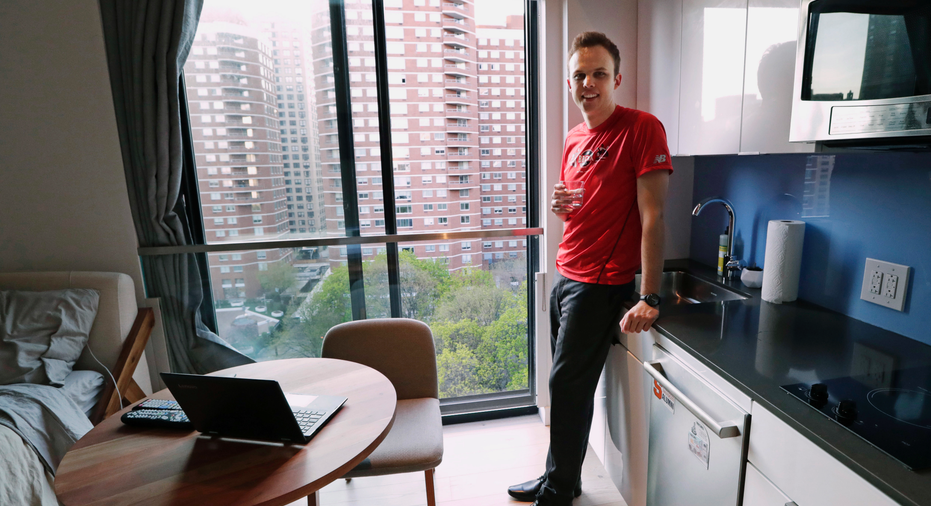As rents soar, co-living becomes a more appealing option

Big city apartment-dwelling can be a financial and emotional drain, but the growing trend of co-living can soften the blow.
Co-living comes in many varieties, from shared houses to luxurious mini-apartments. But the basic premise is the same: Renters can save money and expand their social circle if they're comfortable with smaller digs and shared common spaces. Co-living properties also tend to have more flexible lease terms and no broker fees, which can add thousands to the cost of a rental.
Take Carmel Place, an apartment building in the Kips Bay neighborhood of Manhattan. It opened in 2016 and is run by Ollie, a six-year-old co-living startup. The building has 55 studio apartments that range from 260 to 300 square feet, about the size of a one-car garage. The apartments come with bed linens, towels and furniture designed for tiny living, like a couch that folds into a bed. Residents share a lounge, laundry facilities, a gym and a rooftop terrace.
Apartments at Carmel Place start at $2,775 per month, which includes cable and Wi-Fi, regular housekeeping and access to social events. One block away, an unfurnished, 510-square-foot studio in a building with a gym is listed at $3,150 per month.
Matthew Alexander has lived at Carmel Place for almost two years. He had been living with roommates but wanted a place of his own, and he liked Carmel Place because it was new and offered amenities like grocery delivery.
Alexander has befriended his neighbors through Ollie-planned events like a mixology class in Soho and a tour of a Brooklyn chocolate factory. He doesn't mind his apartment's small size, but thinks it would be too small for two people.
"I like the concept of the micro-studio and minimalist living," said Alexander, 27, who works in human resources at Citigroup.
Rooms at co-living spaces are in high demand. Common, a co-living startup with homes in New York, San Francisco, Chicago and Washington, says it's getting 1,000 applications per week for its 500 bedrooms.
Co-living is such a new trend that no one company has perfected it yet, says Bob O'Brien, the global real estate sector leader for the Deloitte consulting firm. He expects a lot of experimentation over the next five to 10 years.
But he thinks the trend could be here to stay, in part because it appeals to so many people. Even if millennials form families and move to bigger homes, there are plenty of transient contract workers and empty nesters who might fill the void.
Ollie will expand its offerings this month in Long Island City, a neighborhood in Queens, New York. It's opening two- and three-bedroom furnished apartments with kitchens (but no living rooms) on 13 floors of a 42-story high rise. It will help match roommates who can pay as little as $1,393 per month for a small bedroom with a shared bath. Residents have access to an indoor lap pool and a gym.
In the same neighborhood, Craigslist is advertising a bedroom in a two-bedroom apartment for $2,021 per month.
"What we're trying to do is create Class B pricing for a Class A product," said Christopher Bledsoe, Ollie's co-founder and CEO. Ollie brings down costs by fitting a lot of people into its buildings and negotiating with furniture suppliers and other vendors.
Bledsoe says two-thirds of Ollie's renters are under 35. But most of the rest are over 50.
WeLive — which spun off from WeWork shared office spaces — is another co-living option, with buildings in Arlington, Virginia, and New York that have 200 apartments each plus shared office space. The fully furnished apartments are a little larger than Ollie's, but there's a similar focus on big common areas and amenities like housekeeping. A WeLive studio apartment in Arlington starts at $1,500 per month, or about $100 less than a nearby unfurnished studio listed on Apartments.com.
Other co-living startups are offering even cheaper accommodations without fancy amenities. HubHaus, a two-year-old startup based in Los Altos, California, rents homes from landlords and configures them for shared living, sometimes adding rooms to fit more people. HubHaus matches housemates and rents unfurnished bedrooms; the common areas are furnished, Wi-Fi is provided and cleaners come twice a month. HubHaus also sponsors activities like backpacking trips and house dinners.
A room in a five-bedroom HubHaus home near Apple Inc.'s headquarters in Cupertino, California, is available for $1,250 per month. Up the street, a room with a bathroom is being offered on Craigslist for $1,300. A one-bedroom apartment in the same neighborhood is available for $2,750.
Shruti Merchant, HubHaus's co-founder and CEO, says the company currently has 464 rooms at 75 houses around San Francisco and Los Angeles.
Merchant says co-living is gaining in popularity because affordable apartments are scarce. She also thinks young people feel disconnected and want housing that prioritizes community over privacy.



















